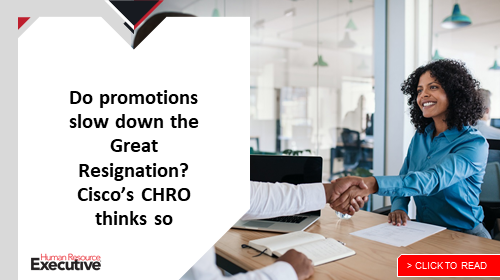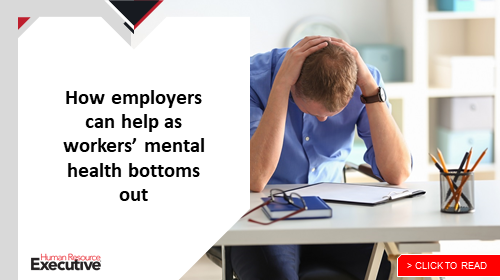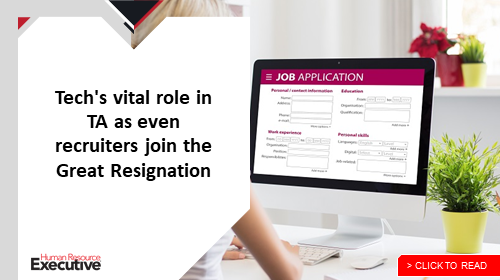I left my position as CHRO of Symantec in February 2020. Having never been jobless since college, I expected to relax, travel, spend time with my family, and indulge in some cooking lessons. The best-laid plans, right? I spent most of 2020 with my family … all day … every day. I took so many classes and cooked so many meals during the depths of the pandemic that I finally surrendered to DoorDash and UberEats.
As we all know, this forced time off was a mixed bag. Calamity and opportunity are usually two sides of the same coin, and I had to choose which side to focus on. Rather than break the monotony by rushing back into the job market, I used those months to focus on getting more fit, both physically and mentally. Apparently, I wasn’t alone.
Finally, in May 2021, I joined next-gen data management firm Cohesity as its CHRO. Before Cohesity, I worked for large enterprises with very traditional thinking around work locality. If you weren’t in the office, you weren’t working. But like many firms, Cohesity had pivoted to a hybrid work model. I came into the office twice per week and worked remotely for the rest.
Related: 10 things Microsoft has learned about successful hybrid work
Cohesity is unconventional in other ways, as well. With my former employers, mental health issues were always on par with head lice: You never admitted to them in public forums. If you developed a mental health issue, the employee assistance program might provide two or three half-hour sessions, then you’d be forced into using whatever half-measured coverage the company healthcare plan provided.
 Cohesity is the antithesis of this legacy approach. Our meetings involve personal check-ins. We ask questions like “What was your best learning last week?” and “What thing in your past will you bring into your future?”
Cohesity is the antithesis of this legacy approach. Our meetings involve personal check-ins. We ask questions like “What was your best learning last week?” and “What thing in your past will you bring into your future?”
For many, this will sound foofy and extraneous, so let me clarify. We’re a late-stage startup. No one chills on their bean bag chair, sipping bubble tea and shooting mini-hoops. We work fast and hard, but not at the expense of personal wellness or building mutual accountability and trust.
I’m not here to talk up Cohesity. Rather, I see the company as a bellwether of changing times and macro-level conditions. As I type this, the ongoing Great Resignation—the Big Quit, or whatever else you want to call it—continues to deepen. U.S. Bureau of Labor Statistics data shows year-over-year quit rates increasing in all regions, with the highest resignation numbers in the leisure and hospitality sectors. Interestingly, some of the lowest rates and increases come from areas including government and finance. Food service worker resignations increased by over 50%. Educational quit rates have more than doubled.
What should we take away from this, at a time when labor strikes increasingly make headlines? Quite simply, things changed. For better or worse, the pandemic was a pivotal social moment. People stuck at home suddenly had time to stop, think and reevaluate. “What am I doing?” many asked. “Where do I have passion? Who do I want to spend my time with? And, how am I emotionally? What am I equipped to handle, and do I need to really be happy moving forward?”
Related: This ‘people connector’ knows the value of empathy
The pain of isolation forced a new or magnified focus on mental wellbeing and self-care. And that focus on wellbeing and self-care is not going away. In fact, employers will start to find that employees don’t just care about rewards and perks, they care about empathy.
 A cynic might view this new push for work-based personal wellness as short-term coddling. Get people back to work with a hug, let them get comfortable, then slowly withdraw the crutches. Companies that appreciate and embrace the humanity of their workers and cultivate empathy will see wellness measures as nourishments, not pacifiers.
A cynic might view this new push for work-based personal wellness as short-term coddling. Get people back to work with a hug, let them get comfortable, then slowly withdraw the crutches. Companies that appreciate and embrace the humanity of their workers and cultivate empathy will see wellness measures as nourishments, not pacifiers.
Empathy’s role in tools and systems
Workers need wellness, and employers need empathy. These two qualities dovetail like yin and yang, one feeding into the other. However, empathy needs to go beyond promoting emotional wellbeing; it must address other needs. Empathetic companies will be proactive in deploying workforce development and equipping employees with new, valuable skills so that they can transition successfully through these changes. Here again, empathy is as good for workers as it is for the bottom line.
Empathy is no longer proprietary to small, family-run businesses. The pandemic has made empathy a vital part of modern enterprise operations. Ignore it at your peril.
Implementing empathy doesn’t require psycho-specialists and exorbitant retreats. Think about refresh Fridays or no-meeting Mondays. What about offering small time blocks for meditation? What about somehow helping workers with their sabbaticals? When I came aboard at Cohesity, I found the teachings of Shirzad Chamine’s Positive Intelligence embedded in the company culture. The book delves into the ways in which our minds simultaneously pursue and sabotage our success. Like most others at Cohesity, I devoured the lessons and worked to integrate them into my daily tasks and weekly meetings. The personal and productivity impact for me has been enormously beneficial.
 Also, consider empathy from a tools and systems perspective. You wouldn’t ask someone to move gravel with a bucket when you could give them a wheelbarrow. Neither would you deny them tools that helped them be more productive and enjoy smoother workflows. Invest in better software and outside expertise for guidance, when needed. Also, perhaps move the decision-making center of gravity lower in the organization. In-person meetings attended by everyone possible might give way to Slack, asynchronous meetings, or even just a more predictable communication cadence with only the most essential participants.
Also, consider empathy from a tools and systems perspective. You wouldn’t ask someone to move gravel with a bucket when you could give them a wheelbarrow. Neither would you deny them tools that helped them be more productive and enjoy smoother workflows. Invest in better software and outside expertise for guidance, when needed. Also, perhaps move the decision-making center of gravity lower in the organization. In-person meetings attended by everyone possible might give way to Slack, asynchronous meetings, or even just a more predictable communication cadence with only the most essential participants.
These aren’t gimmicks or competitive differentiators. These measures show you care about employees’ needs and happiness. And workers will reciprocate. Studies show that people are willing to take lower wages for companies that are more flexible and cognizant of employees’ needs. I’m not saying you should pay people less. I’m reiterating the interplay between empathy and wellness. These two qualities go both ways.
To recap, the tactics around hiring and retaining talent that worked under yesterday’s rules probably won’t work as well going forward. Perceptions, and thus expectations, have changed, and empathy is the critical conduit for navigating these changes. Empathy from employers correlates to worker productivity. As such, it behooves companies to bend their conventional norms around emerging employee needs, such as location and schedule flexibility, personal development, colleague trust and communication, and investment in reducing job flow friction. In short, empathy may be the not-so-secret answer to preserving cohesion across a distributed workforce and elevating your people. Embrace it, and enjoy the results.



